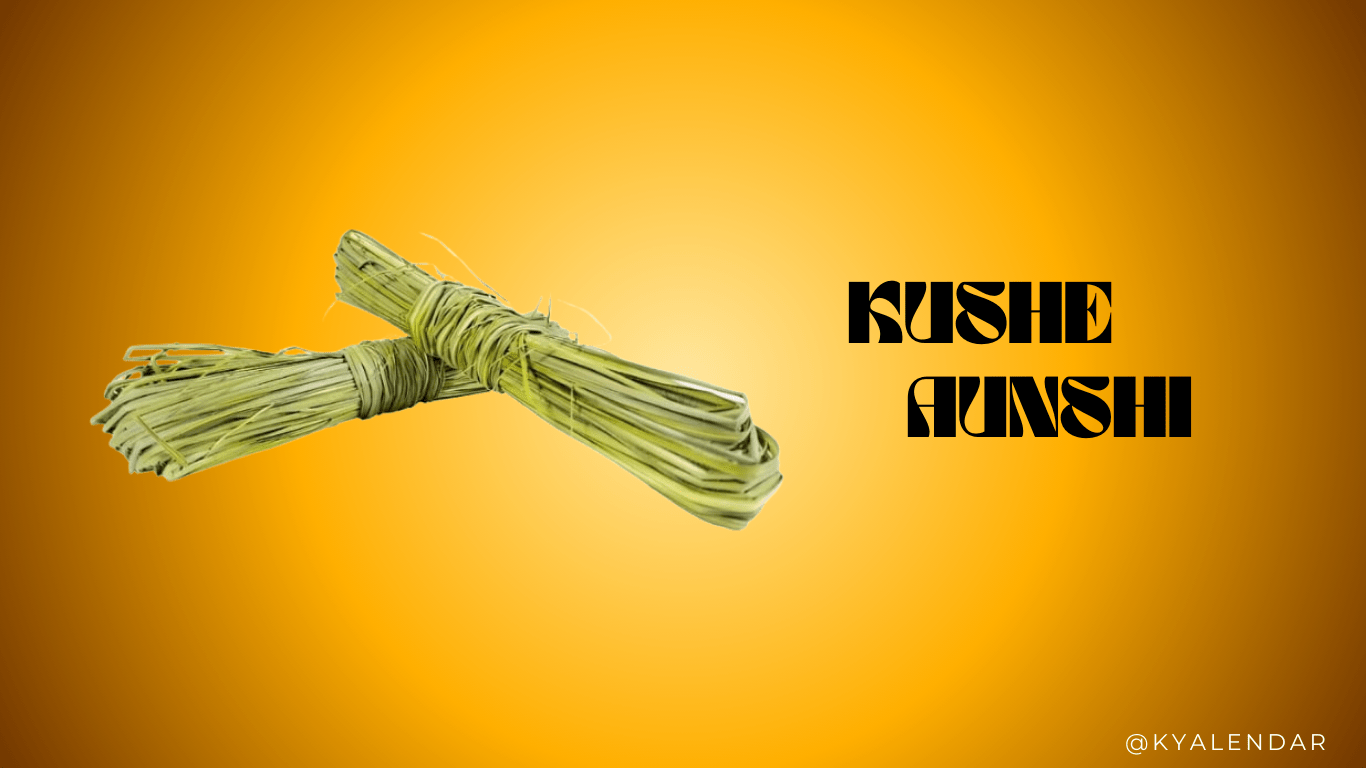
- This event has passed.
Kushe Aushi
September 2

Kushe Aunshi, also known as Kushotpatini Aunshi or Pitri Aunshi, is a revered festival in Nepal, celebrated primarily by the Hindu community. Falling on the no-moon day (Aunshi) of the Nepali month of Bhadra (August-September), this day is marked by the worship of fathers and the sacred grass called Kush. Kushe Aunshi embodies the respect for one’s ancestors and the deep-rooted cultural practices that continue to shape Nepali society.
Cultural Significance:
Kushe Aunshi is a unique blend of devotion to one’s father and reverence for the sacred Kush grass. The grass, believed to have purifying properties, is harvested on this day and is considered essential for various Hindu rituals. This dual focus on the sacred grass and paternal respect makes Kushe Aunshi a festival that beautifully intertwines spiritual beliefs with family values.
The Role of Kush Grass:
The festival is named after the Kush grass, which plays a crucial role in Hindu rituals. Kush is believed to have originated from the body of Lord Vishnu, making it highly sacred. During Kushe Aunshi, devotees wake up early to harvest the grass from specific fields or riversides. The collected Kush is then brought home, where it is worshipped along with other deities. The grass is kept throughout the year and is used in various religious ceremonies, such as pujas, weddings, and last rites. It is believed to purify anything it touches, from ritual spaces to offerings, making it an indispensable part of Hindu worship practices.
Honouring Fathers:
Kushe Aunshi is also widely recognized as Pitri Aunshi, where “Pitri” refers to ancestors. This aspect of the festival is dedicated to honouring one’s father. In Nepali culture, the father is seen as a figure of authority, wisdom, and guidance. Kushe Aunshi provides an opportunity for sons and daughters to express their respect and gratitude towards their fathers.
On this day, children perform special rituals for their fathers, offering them food, clothes, and gifts. Fathers, in return, bless their children, ensuring their well-being and success. This exchange symbolizes the deep bond between parent and child, reinforcing the values of respect and family unity. The festival acts as a reminder of the responsibilities and respect that children owe to their parents, especially in a society where familial ties are of utmost importance.
Shraddha for Deceased Fathers:
For those whose fathers have passed away, Kushe Aunshi is a day to perform Shraddha—a ritual meant to honour and appease the spirits of the deceased. This ritual is typically conducted at home or at sacred sites like the Gokarneshwor Mahadev Temple in Gokarna, a village near Kathmandu. The temple is dedicated to Lord Shiva and is believed to be a powerful place for performing ancestral rites.
During Shraddha, offerings of food, water, and other items are made to the departed souls, accompanied by prayers for their peace and liberation. It is believed that these offerings help in the spiritual journey of the ancestors, ensuring their well-being in the afterlife. This practice highlights the deep respect and love that Nepali culture holds for ancestors, acknowledging their continued presence and influence in the lives of the living.
Gokarna Aunshi:
In the Kathmandu Valley, Kushe Aunshi is also referred to as Gokarna Aunshi due to the importance of the Gokarneshwor Mahadev Temple during this festival. The temple, located near the Bagmati River, attracts thousands of devotees on this day. Those who have lost their fathers visit the temple to perform Shraddha rituals. It is believed that offering prayers at this temple during Kushe Aunshi ensures that the souls of the deceased fathers find peace and are freed from the cycle of rebirth.
The name “Gokarna” itself is significant in Hindu mythology. According to legend, Gokarna is the place where Lord Shiva revealed himself to the gods in the form of a cow. The temple, therefore, holds immense religious importance, and performing rituals here is considered highly auspicious.
Rituals and Traditions:
Kushe Aunshi is a day filled with rituals that strengthen family bonds and spiritual connections. The day begins with the harvesting of Kush grass, which is then sanctified through prayers and offerings. The grass is carefully stored for use throughout the year in various religious ceremonies.
Children, particularly sons, perform rituals to honour their fathers. These rituals include offering food, clothes, and other gifts as tokens of love and respect. Fathers, in turn, bless their children, ensuring their prosperity and success. The ritual is a powerful reminder of the reciprocal relationship between parents and children, where love, respect, and blessings are exchanged.
For those whose fathers have passed away, the Shraddha ritual is an essential part of Kushe Aunshi. This ritual involves offering food and prayers to the departed souls, seeking their blessings for the family. It is a day of remembrance and respect, acknowledging the enduring influence of ancestors on the lives of the living.
Modern Observance:
While Kushe Aunshi is deeply rooted in tradition, its observance has adapted to modern times. In urban areas, families may not harvest Kush themselves but purchase it from markets. However, the essence of the festival—respect for fathers and ancestors—remains unchanged.
In contemporary Nepal, Kushe Aunshi is a day when families come together, reinforcing the importance of familial ties in an increasingly fast-paced world. The festival serves as a reminder of the cultural values that continue to guide Nepali society, even as it modernizes.
Conclusion:
Kushe Aunshi is more than just a festival; it is a profound expression of respect for one’s father and ancestors. By honouring the sacred Kush grass and performing rituals for fathers, both living and deceased, the festival reinforces the importance of family, tradition, and spirituality in Nepali culture. As families gather to celebrate Kushe Aunshi, they are not only preserving their cultural heritage but also passing it on to future generations, ensuring that the values of respect, gratitude, and love continue to thrive.